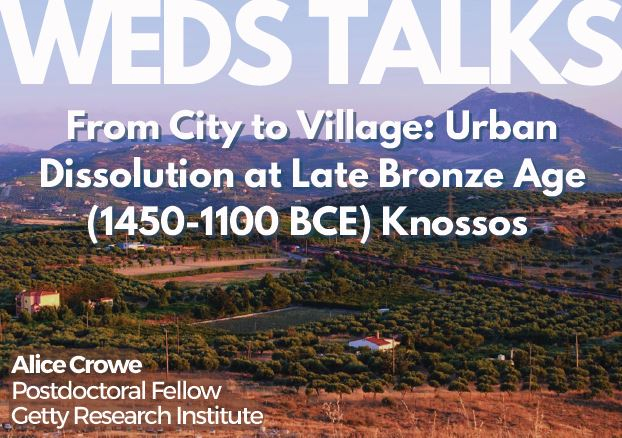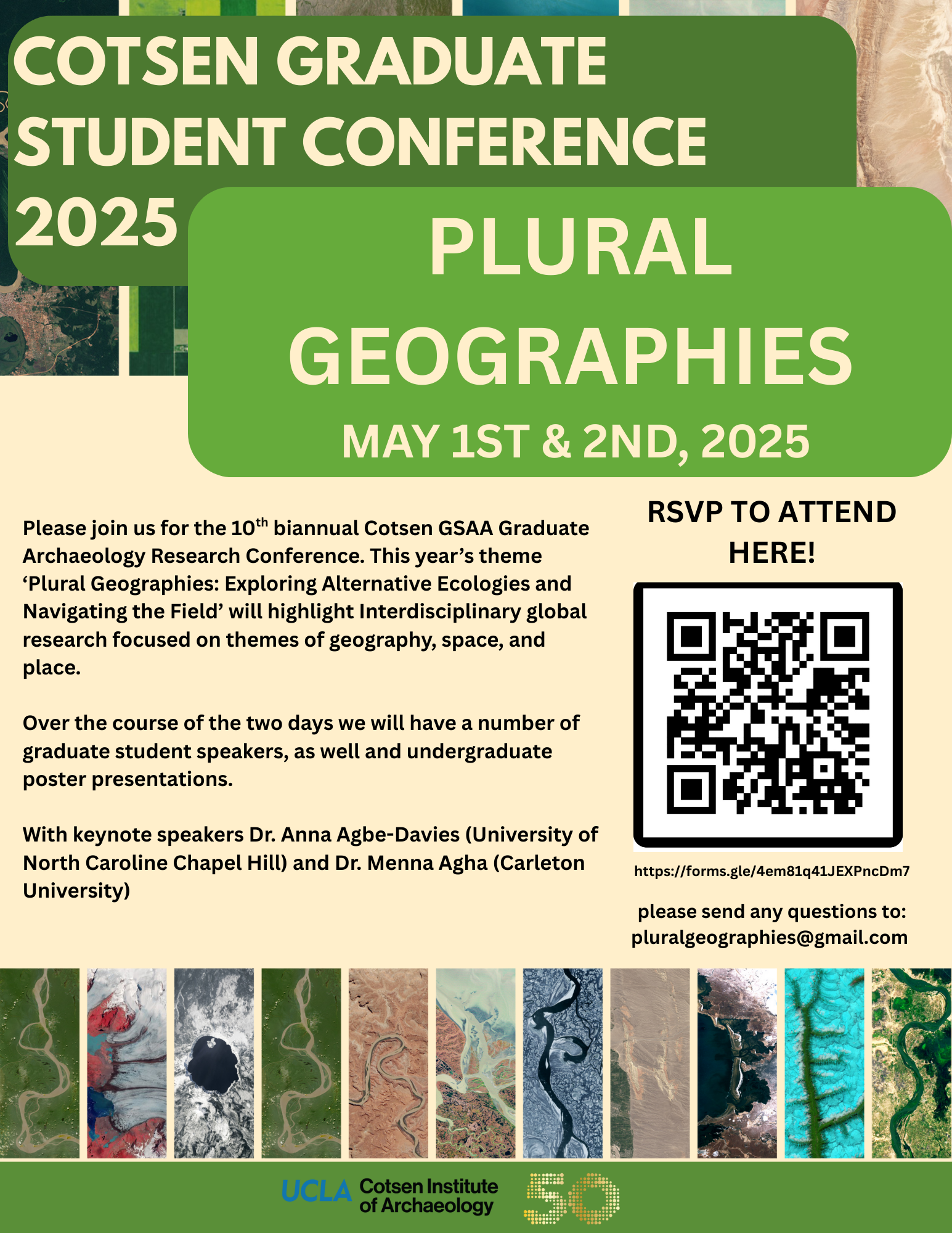Past Events
Interested in Cotsen events? Sign up for our mailing list.The Andean Working Group presents "Kubler in Cuzco: Shaping Architectural Modernity After the 1950 Earthquake" by Dr. Lucia Allais, Associate Professor in the Columbia University Graduate School of Architecture, Planning, and Preservation.
Registration is required for in-person and virtual participation. Register at tinyurl.com/AWGAllais
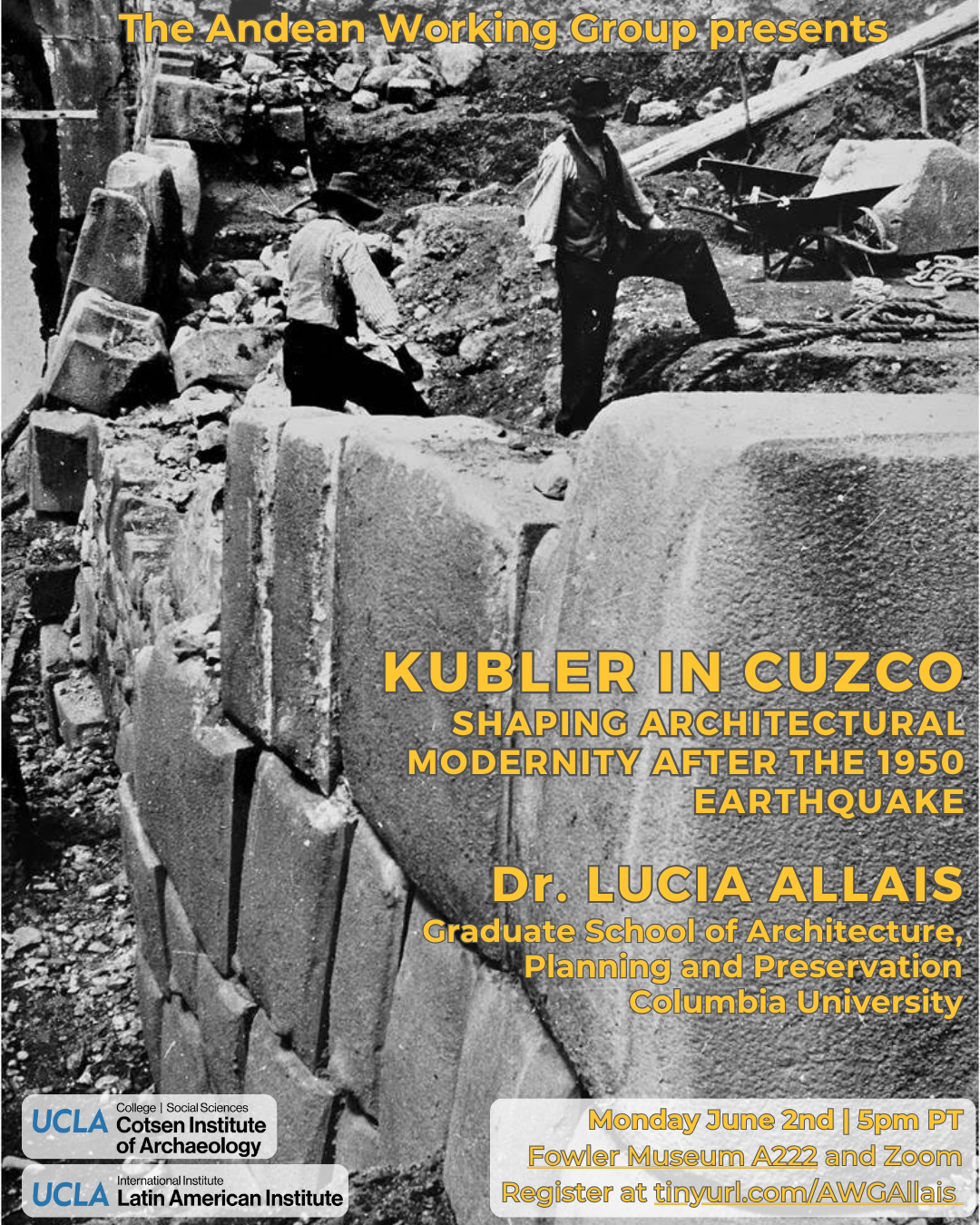
This event is co-sponsored by the UCLA Latin American Institute and the Cotsen Institute of Archaeology.
Download the flyer here.
Contact Alba Menéndez Pereda
Email albamenendez@ucla.edu
Phone
Spring 2025 Waystation Workshop
Dr. Emiliano Ricardo Melgar Tisoc
Researcher, Templo Mayor Museum, Instituto National de Antropología y Historia (INAH)
Using approximately 40 lithic artifacts recently accepted into the Waystation’s voluntary return program, Emiliano Melgar will demonstrate analytic methods through a first traceological examination to determine their ancient Mexican cultural affiliation and technological styles. He will discuss different techniques of identifying raw materials and manufacturing traces, what information can be obtained from them, the accuracy and limitations of these techniques, and the importance of reference assemblages for comparative purposes.
Register for the workshop here
 Dr Melgar earned a BA in Archaeology from the National School of Anthropology and History (ENAH) in Mexico and an MA and Ph.D. in Anthropology from National Autonomous University of Mexico (UNAM). Since 2004 he has been a full-time researcher at the Templo Mayor Museum. Dr Melgar’research has been awarded the 2010 Alfonso Caso Award for best bachelor thesis in archaeology, the 2011 Teotihuacan Award for best essay on the materials of that city, and the 2019 Award of the Mexican Academy of Sciences for the best young researcher in the Mexican Humanities. He has written five books and more than 80 articles for domestic and foreign publications. His new book, “Lapidary Objects from the Great Temple: Styles and Technological Traditions”, received the Honorable Mention in the 2024 INAH Prize for the best archaeological research in Mexico.
Dr Melgar earned a BA in Archaeology from the National School of Anthropology and History (ENAH) in Mexico and an MA and Ph.D. in Anthropology from National Autonomous University of Mexico (UNAM). Since 2004 he has been a full-time researcher at the Templo Mayor Museum. Dr Melgar’research has been awarded the 2010 Alfonso Caso Award for best bachelor thesis in archaeology, the 2011 Teotihuacan Award for best essay on the materials of that city, and the 2019 Award of the Mexican Academy of Sciences for the best young researcher in the Mexican Humanities. He has written five books and more than 80 articles for domestic and foreign publications. His new book, “Lapidary Objects from the Great Temple: Styles and Technological Traditions”, received the Honorable Mention in the 2024 INAH Prize for the best archaeological research in Mexico.
Contact Lyssa Stapleton
Email waystation@ioa.ucla.edu
Phone
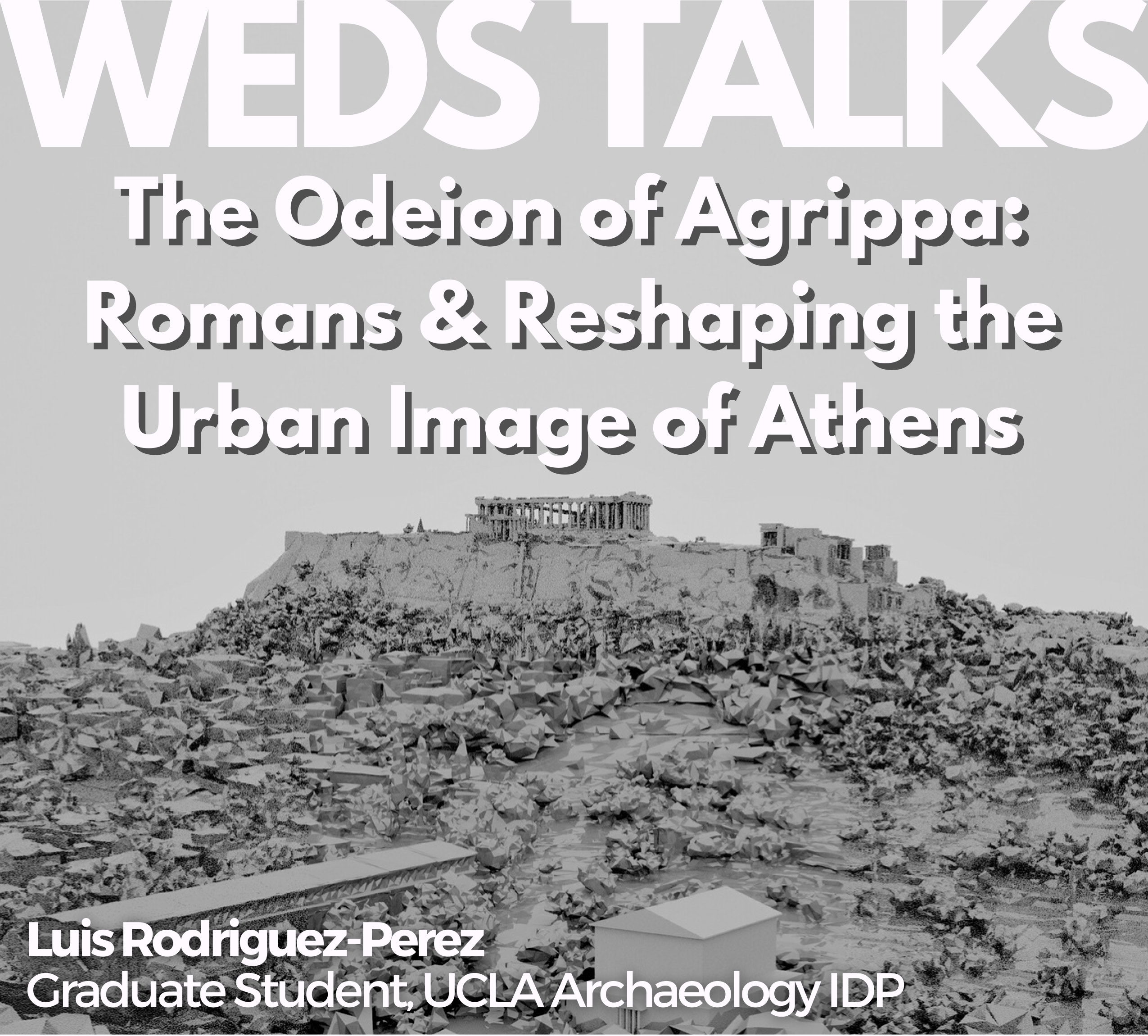
ABSTRACT: The Odeion of Agrippa was among the first major Roman constructions in the city of Athens after years of spoliation. Despite an assemblage of "similar" buildings that the Romans constructed in the city, the Odeion of Agrippa stands out both spatially and architecturally. In 2024, I carried photogrammetric captures of the site to reconstruct how the building fit in the local topography and how it engaged in the surrounding architectural programming of the city. I argue that not only did Romans utilize architectural ornamentation to steer the city in a new direction, but they created a new space that enmeshed their own history with Athens' heroic past.
BIO: Luis Rodriguez-Perez is a 3rd year Ph.D. student at the Cotsen Institute of Archaeology at UCLA. His research focuses on identity and architecture in early Roman Athens, applying 3D and other visualization methods.
Contact Sumiji Takahashi
Email sutakahashi@ioa.ucla.edu
Phone 310-825-4169
The UCLA Department of Classics and the Cotsen Institute of Archaeology present a lecture by Rebecca R. Benefiel, Abigail Grigsby Urquhart Professor of Classics at Washington and Lee University on The Nature of Ancient Graffiti: Exploring Popular Writing in Pompeii.
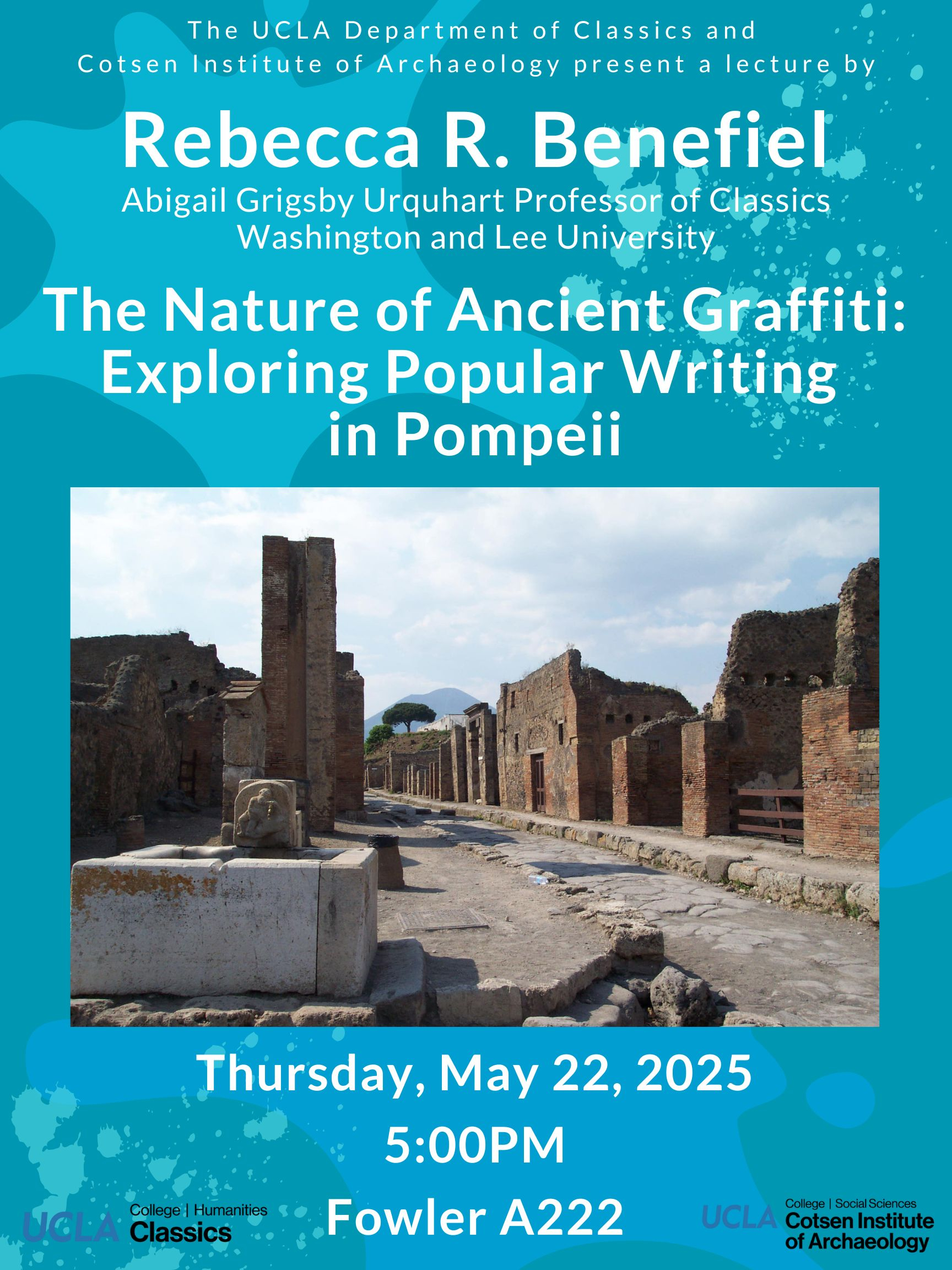
Contact
Phone
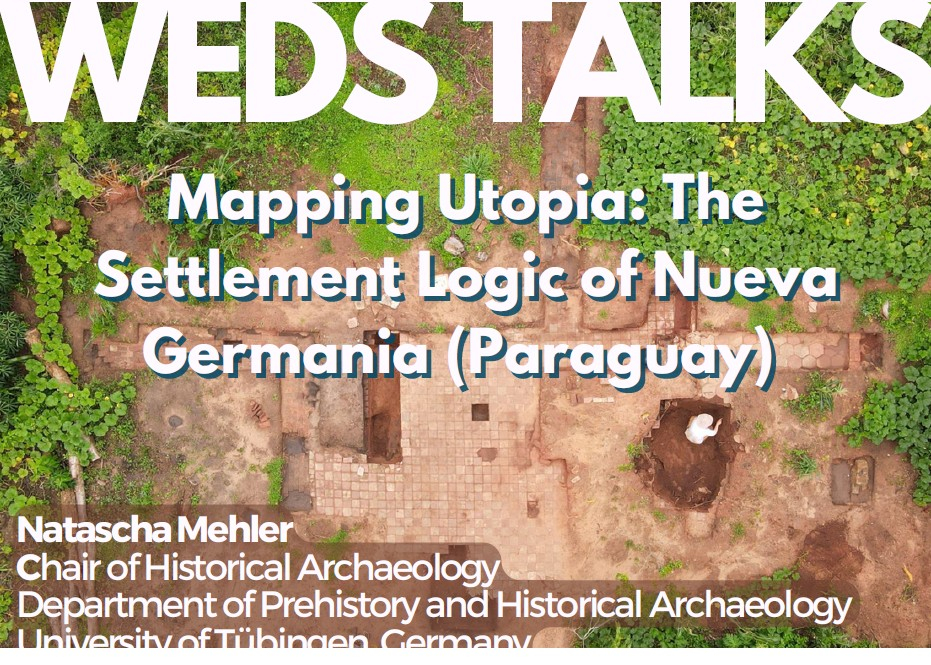
ABSTRACT: This talk will investigate processes of urban dissolution, a phenomenon herein defined as the loss of the urban scale. In contrast to the robust body of archaeological literature on urban formation and urban maintenance, comparatively few analyses have targeted urban decline, particularly in an Aegean context, where the disappearance of urbanism has been presumed the byproduct of the collapse of the state. Positioned in opposition to these narratives, the talk examines the urban dissolution of Late Bronze Age Knossos. From the mid-18th to mid-15th centuries BCE, Knossos was the largest city in the Aegean, twice the size of the region’s other settlements. About 350 years later, it had lost three quarters of its urban fabric and dwindled to the size of a village. The talk analyzes how and why the loss of urbanism occurred, through study of material evidence recovered by over a century of archaeological exploration in the Knossos valley.
BIO: Alice Crowe is a Postdoctoral Fellow at the Getty Research Institute. She received her Ph.D. and M.A. from the University of Cincinnati and a B.A. from Boston University. Her research focuses on the archaeology of the Late Bronze Age Aegean, and centers especially on the site of Knossos, where she explores issues of memory, urbanism and its loss, and ceramic production and consumption. For this research, she has received support from the American School of Classical Studies at Athens, the Archaeological Institute of America, and the University of Cincinnati University Research Council. Beyond ongoing projects at Knossos, she is publishing Late Bronze Age ceramic assemblages collected from the sites of Galatas and Tell Atchana, and by a regional survey of the Brauron area (ARTEMIS).
Contact Sumiji Takahashi
Email sutakahashi@ioa.ucla.edu
Phone 310-825-4169
ABSTRACT: This talk will investigate processes of urban dissolution, a phenomenon herein defined as the loss of the urban scale. In contrast to the robust body of archaeological literature on urban formation and urban maintenance, comparatively few analyses have targeted urban decline, particularly in an Aegean context, where the disappearance of urbanism has been presumed the byproduct of the collapse of the state. Positioned in opposition to these narratives, the talk examines the urban dissolution of Late Bronze Age Knossos. From the mid-18th to mid-15th centuries BCE, Knossos was the largest city in the Aegean, twice the size of the region’s other settlements. About 350 years later, it had lost three quarters of its urban fabric and dwindled to the size of a village. The talk analyzes how and why the loss of urbanism occurred, through study of material evidence recovered by over a century of archaeological exploration in the Knossos valley.
BIO: Alice Crowe is a Postdoctoral Fellow at the Getty Research Institute. She received her Ph.D. and M.A. from the University of Cincinnati and a B.A. from Boston University. Her research focuses on the archaeology of the Late Bronze Age Aegean, and centers especially on the site of Knossos, where she explores issues of memory, urbanism and its loss, and ceramic production and consumption. For this research, she has received support from the American School of Classical Studies at Athens, the Archaeological Institute of America, and the University of Cincinnati University Research Council. Beyond ongoing projects at Knossos, she is publishing Late Bronze Age ceramic assemblages collected from the sites of Galatas and Tell Atchana, and by a regional survey of the Brauron area (ARTEMIS).
Contact Sumiji Takahashi
Email sutakahashi@ioa.ucla.edu
Phone 310-825-4169
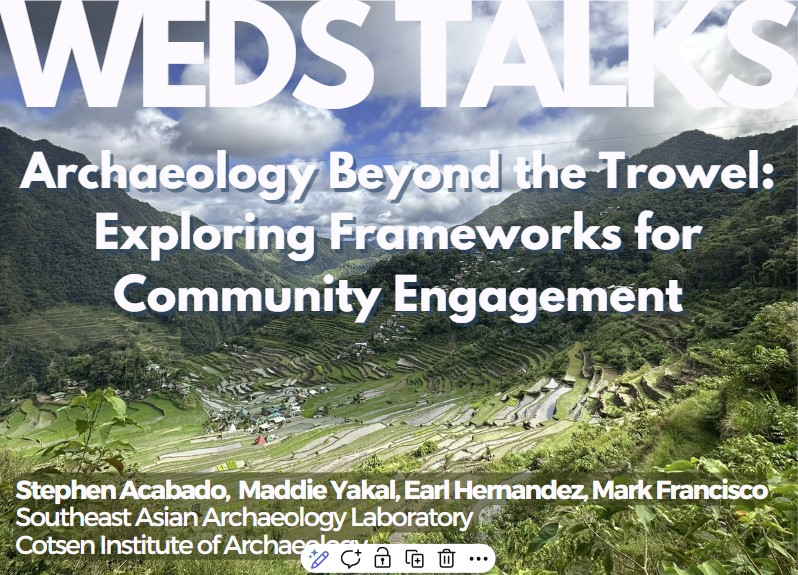
ABSTRACT: This panel presents the SEAALAB framework Archaeology Beyond the Trowel, which positions community engagement as a core practice and protocol in archaeology. Moving beyond research design, the approach insists on meaningful consultation, shared authorship, and transparency as foundational to ethical research. We confront questions archaeologists must grapple with: Who defines what counts as knowledge? Whose interpretations matter? What does consent look like beyond paperwork? The presentation reflects on the discipline’s entanglements with colonialism and extraction, and how these legacies continue to shape field practices and assumptions of authority. By foregrounding community priorities and co-developing research goals, SEAALAB challenges the notion that archaeologists are neutral stewards of the past. Instead, we offer a model for collaborative scholarship grounded in accountability, reciprocity, and respect for living communities whose histories are at stake. This framework is relevant not only for archaeology, but for any field-based discipline working with people and places.
BIO: The Southeast Asian Archaeology Laboratory (SEAALAB) at UCLA focuses on community-engaged research in the Philippines and broader Southeast Asia. The lab investigates culture contact, colonialism, and Indigenous responses through collaborative fieldwork. SEAALAB emphasizes ethical practice, local partnerships, and the integration of Indigenous knowledge in archaeological interpretation. Panelists: Maddie Yakal, Earl Hernandez, Mark Francisco, and Stephen Acabado
Contact Sumiji Takahashi
Email sutakahashi@ioa.ucla.edu
Phone 310-825-4169
The 2025 Cotsen Institute of Archaeology Graduate Student Conference centers on the theme of “Plural Geographies: exploring Alternative Ecologies and navigating through the Field.” This topic is meant to provide a platform for alternative approaches to archaeological methods. With this year’s theme, the conference organizing committee encourages graduate students to reflect, explore, and challenge the field of archaeology and related fields, especially through spatial, placebased, land-based, ecological, or geographical means, construed broadly. We root our discussions within the realms of geography, space, and place in order to interrogate the ways in which archaeology is necessarily intertwined with discussions of land, land use, ecology, political ecologies and more across multiple scales, from the material level of excavation and other forms of land-based research to its engagement and entanglement with the construction of nations and inscription of borders on a global scale. We look forward to welcoming discussion on systemic, disciplinary, and personal approaches to negotiating bias, identity, and deep-rooted legacies of colonialism within the field.
Plural Geographies features two keynote speakers who together represent diverse scholarly backgrounds and intellectual engagements with the conference theme: Dr. Anna Agbe-Davies (UNC-Chapel Hill), a historical archaeologist with a particular focus on African diasporic contexts, and Dr. Menna Agha (Carleton University), an architect and scholar of social justice within the field of architecture. They will be joined by 13 papers presentations, roundtable and breakout sessions, undergraduate poster session, and a film screening from graduate students and community across different fields working around the globe.
Registration for in-person or Zoom required.
For more information on papers and the timing of sessions and speakers, please see the schedule. For any inquiries, questions, or comments, please email the Organizing Committee at pluralgeographies@gmail.com.
Contact Graduate Student Conference Committee
Email pluralgeographies@gmail.com
Phone
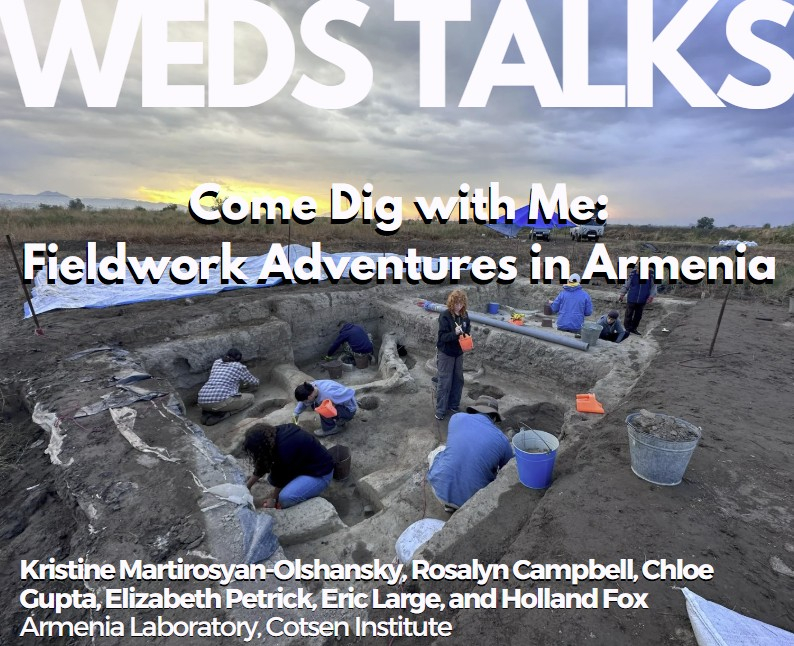
ABSTRACT: This talk explores the fieldwork experiences of undergraduate students participating in the Masis Blur Neolithic Archaeological Project in Armenia. As one of the region's earliest known farming settlements, Masis Blur offers a rich context for hands-on learning in archaeological excavation, analysis, and cultural heritage preservation. The presentation highlights student involvement in daily field operations, laboratory work, and engagement with the local and culture. Through firsthand accounts the talk underscores the value of experiential learning in shaping future archaeologists. But put simply, come, learn what we did last summer!
BIO: Kristine Martirosyan-Olshansky is an assistant researcher at the Cotsen where she directs the Armenia Laboratory, and she has been the co-directing the Masis Blur Archaeological Project since 2012. Rosalyn Campbell is a bioarchaeologist and Egyptologist who has excavated through the Middle East, Africa, as well as Peru and North America. Chloe Gupta, Elizabeth Petrick, Eric Large, and Holland Fox are undergraduate students at UCLA. Chloe, Elizabeth, and Eric are also the founding members of the “risen from the ashes” Undergraduate Archaeology Club.
Contact Sumiji Takahashi
Email sutakahashi@ioa.ucla.edu
Phone 310-825-4169
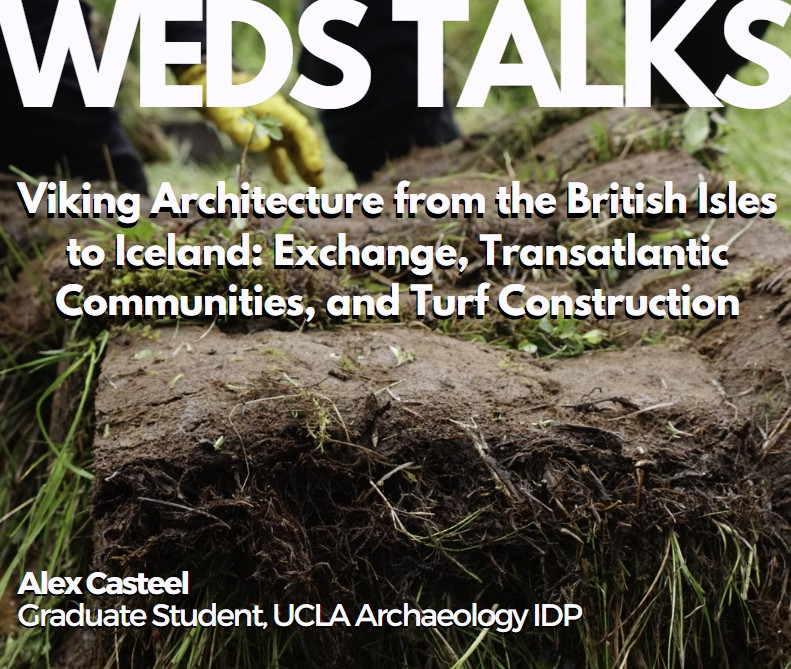
ABSTRACT: This talk, a work in progress, questions the logic that continues to marginalize Vikings within the fields of art and architectural history. This paper instead explores the possibility and subsequent implications of artistic and architectural exchange across the Viking diaspora. It does so primarily by examining the functional commonalities of a wall construction technique in use in the British Isles and after circa 865, in Iceland, across respective mediums of stone and turf.
BIO: Alex is a 3rd-year PhD student in the Cotsen Institute of Archaeology. His ongoing research is a product of collaboration, and he has received especially generous support for his fieldwork from the Leifur Eiríksson Foundation.
Contact Sumiji Takahashi
Email sutakahashi@ioa.ucla.edu
Phone 310-825-4169
- 1 of 49
- next ›




